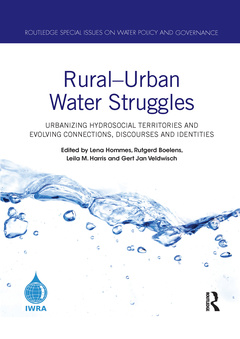Description
Rural–Urban Water Struggles
Urbanizing Hydrosocial Territories and Evolving Connections, Discourses and Identities
Routledge Special Issues on Water Policy and Governance Series
Coordinators: Hommes Lena, Boelens Rutgerd, Harris Leila M., Veldwisch Gert Jan
Language: English
Subjects for Rural–Urban Water Struggles:
Keywords
Hydrosocial Territorial; Rural Urban Water; rural water; Pe Scheme; urban water; Water Governance; rural-urban water struggles; Vice Versa; hydrosocial territories; Agro Export Companies; political ecology of urbanization; Metro Manila; political ecology; Hydraulic Infrastructure; Hydrosocial Cycle; water justice; Metropolitan Manila; environmental justice; National Water Authority; governmentality; Ica River; water international; Buen Vivir; Pe Project; El Chorro; Cochabamba Water War; Allocation Protocol; Cauvery Water; Aguas Del Tunari; Water Parks; Northern Mountain Range; White Commercial Farmers; Private Water Market; Pe Programme; Cochabamba City
Publication date: 06-2021
· 17.4x24.6 cm · Paperback
Publication date: 08-2019
· 17.4x24.6 cm · Hardback
Description
/li>Contents
/li>Readership
/li>Biography
/li>
Rural?Urban Water Struggles compiles diverse analyses of rural?urban water connections, discourses, identities and struggles evolving in the context of urbanization around the world.
Departing from an understanding of urbanization as a process of constant making and remaking of multi-scalar territorial interactions that extend beyond traditional city boundaries and that deeply reconfigure rural?urban hydrosocial territories and interlinkages, the chapters demonstrate the need to reconsider and trouble the rural?urban dichotomy. The contributors scrutinize how existing approaches for securing urban water supply ? ranging from water transfers to payments for ecosystem services ? all rely on a myriad of techniques: they are produced by, and embedded in, specific institutional and legal arrangements, actor alliances, discourses, interests and technologies entwining local, regional and global scales. The different chapters show the need to better understand on-the-ground realities, taking account of inequalities in water access and control, as well as representation and cultural-political recognition among rural and urban subjects.
Rural?Urban Water Struggles will be of great use to scholars of water governance and justice, environmental justice and political ecology. This book was originally published as a special issue of Water International.
Introduction: Rural–urban water struggles: urbanizing hydrosocial territories and evolving connections, discourses and identities Lena Hommes, Rutgerd Boelens, Leila M. Harris and Gert Jan Veldwisch 1. Water crisis through the analytic of urban transformation: an analysis of Bangalore’s hydrosocial regimes Michael Goldman and Devika Narayan 2. The rural–urban equity nexus of Metro Manila’s water system Philamer C. Torio, Leila M. Harris and Leonora C. Angeles 3. Hydrosocial territories in the context of diverse and changing ruralities: the case of Cochabamba’s drinking water provision over time Paul Hoogendam 4. Colonizing rural waters: the politics of hydro-territorial transformation in the Guadalhorce Valley, Málaga, Spain Bibiana Duarte-Abadía and Rutgerd Boelens 5. The political construction and fixing of water overabundance: rural–urban flood-risk politics in coastal Ecuador Juan Pablo Hidalgo-Bastidas and Rutgerd Boelens 6. Upsetting the apple cart? Export fruit production, water pollution and social unrest in the Elgin Valley, South Africa Matthijs Wessels, Gert Jan Veldwisch, Katarzyna Kujawa and Brian Delcarme 7. Hydrosocial territories, agro-export and water scarcity: capitalist territorial transformations and water governance in Peru’s coastal valleys Gerardo Damonte and Rutgerd Boelens 8. Payment for ecosystem services in Lima’s watersheds: power and imaginaries in an urban-rural hydrosocial territory Sonja Bleeker and Jeroen Vos Conclusion: Evolving connections, discourses and identities in rural–urban water struggles Lena Hommes, Gert Jan Veldwisch, Leila M. Harris and Rutgerd Boelens
Lena Hommes is an Associated Researcher with the Water Resources Management Group of the Department of Environmental Sciences at Wageningen University, the Netherlands. Her research focuses on hydrosocial territories, rural–urban water relations, politics of water infrastructure projects, water justice struggles and socio-environmental transformations in Latin America.
Rutgerd Boelens is a Professor of Water Governance and Social Justice in the Department of Environmental Sciences at Wageningen University, the Netherlands, and a Professor of Political Ecology of Water in Latin America with CEDLA (Centre for Latin American Research and Documentation) at the University of Amsterdam, the Netherlands. He is also a Visiting Professor at the Catholic University of Peru (Department of Social Sciences), Lima, Peru, and the Central University of Ecuador (Faculty of Agricultural Sciences), Quito, Ecuador, and coordinates the international Justicia Hídrica / Water Justice Alliance. He is also the main scientific editor of the book series Water and Society, bringing together various Latin American publishing houses. His work includes articles and books focusing on water rights, water grabbing, hydrosocial territories, legal pluralism, cultural politics, governmentalities and social mobilizations in Latin America and Spain.
Leila M. Harris is a Professor with the Institute for Resources, Environment and Sustainability and with the Institute for Gender, Race, Sexuality and Social Justice at the University of British Columbia (UBC), Vancouver, Canada. At UBC, she is also a member of the EDGES research collaborative and serves as the co-Director for the Program on Water Governance (PoWG). Her research focuses on the social, political and equity dimensions of environment and resource issues, with particular interest in water politics and governance. Recent projects have included focus on water access and governance in Ghana, South Africa and
These books may interest you

Urban Water Reuse Handbook 281.07 €



